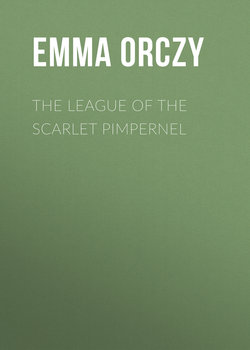Читать книгу The League of the Scarlet Pimpernel - Emma Orczy - Страница 5
I
SIR PERCY EXPLAINS
V
ОглавлениеChauvelin hurried to the depot. After those few seconds wherein he had felt dazed, incredulous, almost under a spell, he had quickly regained the mastery of his nerves, and regained, too, that intense joy which anticipated triumph is wont to give.
In the out-at-elbows, half-starved servant of the murdered Terrorist, citizen Chauvelin, of the Committee of Public Safety, had recognised his arch enemy, that meddlesome and adventurous Englishman who chose to hide his identity under the pseudonym of the Scarlet Pimpernel. He knew that he could reckon on Hebert; his orders not to allow the prisoner one moment out of sight would of a certainty be strictly obeyed.
Hebert, indeed, a few moments later, greeted his chief outside the doors of the depot with the welcome news that Paul Mole was safely under lock and key.
"You had no trouble with him?" Chauvelin queried, with ill-concealed eagerness.
"No, no! citizen, no trouble," was Hebert's quick reply. "He seems to be a well-known rogue in these parts," he continued with a complacent guffaw; "and some of his friends tried to hustle us at the corner of the Rue de Tourraine; no doubt with a view to getting the prisoner away. But we were too strong for them, and Paul Mole is now sulking in his cell and still protesting that his arrest is an outrage against the liberty of the people."
Chauvelin made no further remark. He was obviously too excited to speak.
Pushing past Hebert and the men of the Surete who stood about the dark and narrow passages of the depot, he sought the Commissary of the Section in the latter's office.
It was now close upon ten o'clock. The citizen Commissary Cuisinier had finished his work for the day and was preparing to go home and to bed. He was a family man, had been a respectable bourgeois in his day, and though he was a rank opportunist and had sacrificed not only his political convictions but also his conscience to the exigencies of the time, he still nourished in his innermost heart a secret contempt for the revolutionary brigands who ruled over France at this hour.
To any other man than citizen Chauvelin, the citizen Commissary would, no doubt, have given a curt refusal to a request to see a prisoner at this late hour of the evening. But Chauvelin was not a man to be denied, and whilst muttering various objections in his ill-kempt beard, Cuisinier, nevertheless, gave orders that the citizen was to be conducted at once to the cells.
Paul Mole had in truth turned sulky. The turnkey vowed that the prisoner had hardly stirred since first he had been locked up in the common cell. He sat in a corner at the end of the bench, with his face turned to the wall, and paid no heed either to his fellow-prisoners or to the facetious remarks of the warder.
Chauvelin went up to him, made some curt remark. Mole kept an obstinate shoulder turned towards him—a grimy shoulder, which showed naked through a wide rent in his blouse. This portion of the cell was well-nigh in total darkness; the feeble shaft of light which came through the open door hardly penetrated to this remote angle of the squalid burrow. The same sense of mystery and unreality overcame Chauvelin again as he looked on the miserable creature in whom, an hour ago, he had recognised the super-exquisite Sir Percy Blakeney. Now he could only see a vague outline in the gloom: the stooping shoulders, the long limbs, that naked piece of shoulder which caught a feeble reflex from the distant light. Nor did any amount of none too gentle prodding on the part of the warder induce him to change his position.
"Leave him alone," said Chauvelin curly at last. "I have seen all that I wished to see."
The cell was insufferably hot and stuffy. Chauvelin, finical and queasy, turned away with a shudder of disgust. There was nothing to be got now out of a prolonged interview with his captured foe. He had seen him: that was sufficient. He had seen the super-exquisite Sir Percy Blakeney locked up in a common cell with some of the most scrubby and abject rogues which the slums of indigent Paris could yield, having apparently failed in some undertaking which had demanded for its fulfilment not only tattered clothes and grimy hands, but menial service with a beggarly and disease-ridden employer, whose very propinquity must have been positive torture to the fastidious dandy.
Of a truth this was sufficient for the gratification of any revenge. Chauvelin felt that he could now go contentedly to rest after an evening's work excellently done.
He gave order that Mole should be put in a separate cell, denied all intercourse with anyone outside or in the depot, and that he should be guarded on sight day and night. After that he went his way.
